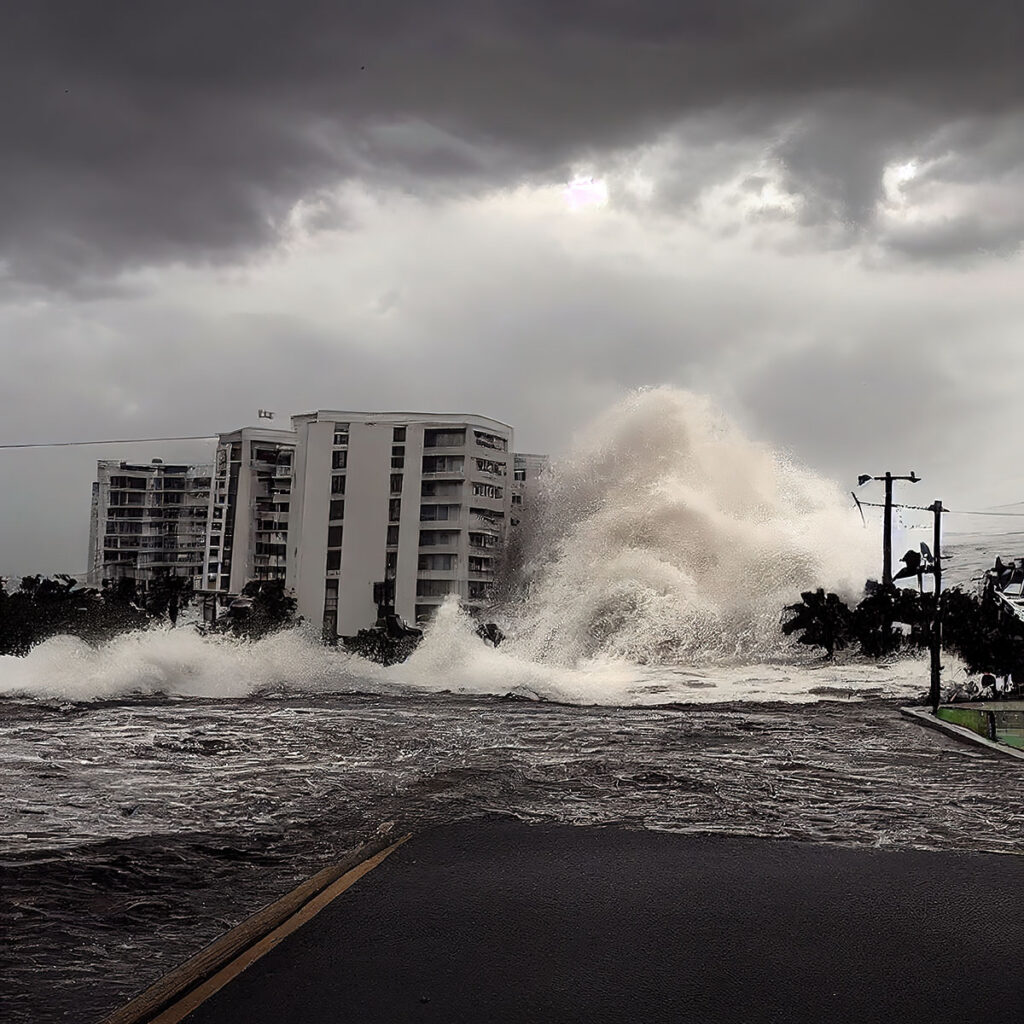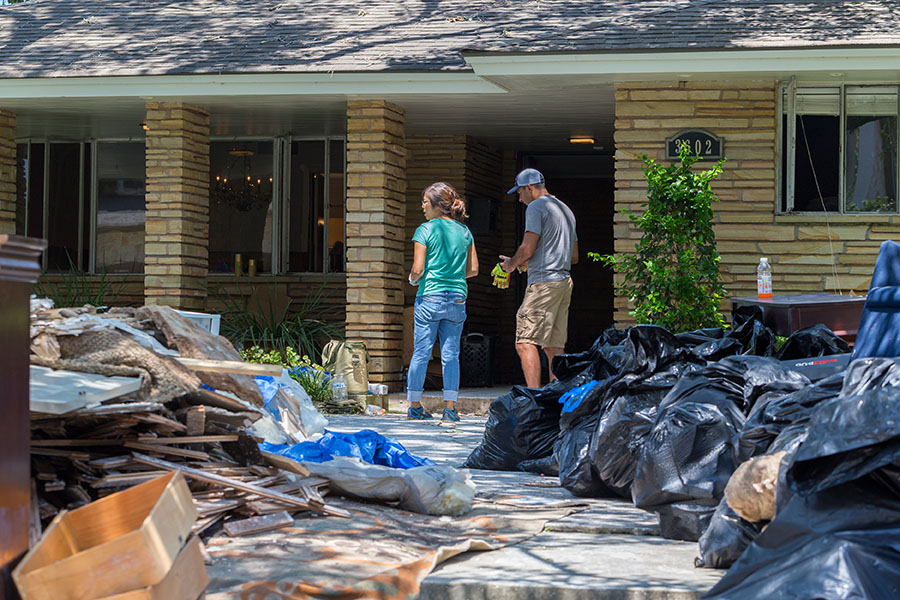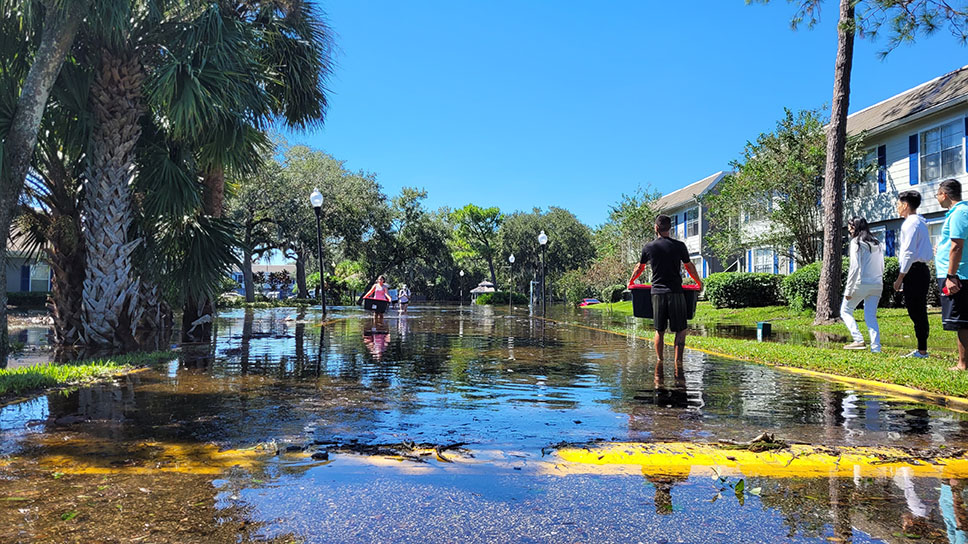Hurricane Cleaning Services
How to manage clean-up and recovery from a severe storm safely, and with confidence
First Call Cleaning Company, LLC has over 30 years of commercial and residential cleaning experience servicing Cocoa, The Villages, Daytona Beach, Melbourne, Ocala, Ormond Beach, Titusville and Canaveral, Florida areas. What we love to join in calling “home” offers beautiful freshwater lakes and beaches, and a mild climate; but Florida’s flat terrain and climate make it prone to severe weather and natural disasters, and can disrupt our everyday lives in dramatic ways. Knowing what you can do to manage cleanup — whether residential or commercial — is vital to preserving you and your community’s health, residence, and investments. Your timely action can make all the difference, and finding a competent, reputable cleaning company can assist in creating safe spaces to preventing the development of further damage and health risks.
Hurricane Facts
- There are approximately 10 tropical storms that develop each year in the Atlantic Ocean. About half of those storms become hurricanes and hit the U.S. coastline.
- Hurricanes are usually approximately 300 miles wide, but can vary in size. The eye of the storm is usually the calmest area and can be about 30-40 miles wide.
- Hurricane-force winds can extend to about 25 miles in a small hurricane and to over 150 miles in a large one.
- The right side of the hurricane is usually the most dangerous area of the storm and can produce storm surges, strong winds, and even tornadoes.
- The path and speed of a hurricane depends on several factors, including weather patterns, and interactions with the atmosphere and the ocean.

Why a Professional Cleaning Service is Important to Your Disaster Recovery Efforts
Safety, prioritizing, and restoration efforts are best met with a professional’s guidance, especially in the face of large national disasters, like Hurricane Ian. There are reparative processes that home and business owners can execute, but if and when opportune, a clean-up professional is ideal to re-establish a baseline.
When re-entering your home after a flood or natural disaster, you must make sure it is safe, and having an experienced professional to assist you is best. You want to be certain there are no structural, electrical, or outlying hazards that put you and your family, tenants, or employees in jeopardy.
Protecting You and Your Family
The Centers for Disease Control and Prevention (CDC) has a very well-informed list regarding what to consider when confronted with disaster aftercare of flooding.
Stay out of floodwater. Wash your hands with soap and water; if not available, alcohol swabs or sanitizer. Diseased water may contain chemicals, bacteria, human and animal waste.
Homes’ electrical facilities must be sound and accounted for. Exposure to contaminated waters can cause rashes, wound infections, gastrointestinal illnesses, Tetanus, and Leptospirosis (rare).
Do not attempt to move propane tanks you may find floating. They are dangerous and combustible. Contact your fire department immediately.
Avoid electrical hazards inside and outside of the home. Shut off electrical power in your home only if you can do so from a dry location. The CDC reinforces doing so, even if it means delaying cleaning. If you cannot access your power sources from a dry area, call a licensed electrician to turn off the power. Once the electrical system has been reviewed, have the electrician put the power back on.
 Turn off natural gas lines or propane tanks. If you smell gas, open all windows and contact the gas company. Leave your home and enter once it is deemed safe. Floods can create shifts or damage in natural gas lines.
Turn off natural gas lines or propane tanks. If you smell gas, open all windows and contact the gas company. Leave your home and enter once it is deemed safe. Floods can create shifts or damage in natural gas lines.
If your house has been closed up for several days, open all windows and wait 30 minutes before entering.
If water damage is present in this scenario, your house has mold and must be treated for mold removal accordingly.
Throw away unsafe foods that have been water contaminated, or improperly refrigerated.
Sanitize all surface areas, including toys.
Do not use your water or take baths until you are certain that your home’s water systems have not been compromised due to community sewage storm-related problems. To ensure your water is safe, review the CDC’s guidelines and preventive measures.
Safety is always executed when using generators and electrical equipment. Talk to the utility company to ensure you use the correct automatic-interrupt devices so that there are no injuries to workers restoring electricity in your community.
Take safe measures to avoid carbon monoxide poisoning. Never use a generator, gas-powered machine, or pressure washer in your basement, home, or garage for less than 20 feet away from all windows, doors, and vents.
If your electricity has been deemed safe by a trusted professional electrician, you can get a “wet-dry shop mop,” a sump pump or a wet vacuum to assist in drying out the moisture in your home.
HVAC systems should be thoroughly cleaned before being turned back on.
If your home and furniture were exposed to water damage, and it was uncared for within a 24-48 hour period, mold damage is present. Everything must be dried completely and then you can determine whether or not you have a moisture/mold problem that is ongoing, thereafter. Make sure mold cleanup is complete before re-entering your home.
Wear an n-95 mask, protective gloves, and goggles when surveying. Mold exposure can instigate asthma attacks, allergic reactions, and skin and eye irritations. Be sure to shower and wash immediately after exposing yourself to mold.
Use bleach to assist you with your clean-up. If you are taking this upon yourself to clean, the CDC makes recommendations regarding how to clean with bleach (*never mix bleach with ammonia).

Be on the alert for leaking containers and reactive household chemicals, such as caustic drain cleaners or chlorine bleach.
Keep children and pets safe. Keep them away from flood water, wet or damaged materials, and leaking or spilled chemicals.
Avoid contact with flood water in and around homes. Assume flood water is contaminated with raw sewage or hazardous chemicals. Do not combine chemicals from leaking or damaged containers as this may produce dangerous or violent reactions. Clean up and discard chemicals separately, even if you know what they are.
Do not dump cleaners, paint, or other chemicals down drains, storm sewers, or toilets.
Do not try to burn household cleaners, paint, or other chemicals.
Clearly mark and set aside unbroken containers until they can be properly disposed of. Leave damaged or unlabeled chemical containers undisturbed whenever possible.
Do not turn on drinking water or well water pumps (risk of electric shock) or use the septic system until you can have it inspected.
Use caution when disturbing building materials to prevent physical injury or other health effects. Building materials may contain hazardous materials such as asbestos that when carried by the air can be breathed in and cause adverse health effects. If you suspect asbestos-containing materials may be present, the materials should not be disturbed. Asbestos-containing materials can include the following:
- boiler/pipe insulation
- fireproofing
- floor tiles
- asbestos roofing
- transit boards used in laboratory tabletops and in acoustics in auditoriums, music rooms, and phone booths
How to Dispose of Your Hurricane Debris
The accumulation of waste and unwanted items can be overwhelming. It is emotional, too, as we survey our homes and businesses, identifying what we warrant as salvageable and not. There are many resources and processes to organize this difficult time.
Loose yard debris may be out in yard containers to be collected. Be sure to make separate, discriminable piles. Do not block public drainage when organizing your removal.
Waste management must be contacted for the removal of appliances and furniture.
Construction, structural, and demolition debris must be sourced for removal by homeowners.
If you need assistance with storm-related clean-up relating to Hurricane Ian, call (800) 451-1954.
Financing Your Clean-Up From a Hurricane
Always check your insurance first, to not create extra steps for yourself. Nothing is more frustrating than doing double the work when you have so much on your mind, emotions are high, and your living or business ownership situation is unstable. Provided aid will always require that you exhaust your current options, and will aim to supplement your assistance as needed.
FEMA and U.S. Small Business Administration representatives are available at your nearest Disaster Recovery Center (DRC) to assist with viable options. If you choose to register online, via mobile app, or by calling an agent, an in-person consult is not necessary (choose one! Don’t double up and prolong your process).
Once you have exhausted your insurance providers’ efforts, storm-related interior clean-up assistance can be provided by local volunteers through late October: (800) 451-1954.
Small Businesses can inquire about disaster loans and assistance for clean-up: SBA’s Disaster Customer Service Center at 1-800-659-2955 or email DisasterCustomerService@sba.gov.
If insured, understand what you are and are not covered for. Know what supplement sources of aid you can receive. If you are not insured there is assisted aid, per Florida State’s Department of Revenue:
Insurance Consumer Assistance -The toll-free Insurance Consumer Helpline is 1-877-693-5236.
Business and consumer-oriented insurance questions can be addressed. Specialists can help individuals review their policies, understand their coverage, file a claim, and assist in communicating with insurance companies.
DFS’s Division of Consumer Services maintains a Hurricane Resources website.
The Division of Consumer Services also houses a Disaster Preparedness website.
Verify repair coverage and contractors. If you have storm damage, contact your insurance agent first to verify that your insurance covers repairs. Before initiating repairs, verify a contractor’s license at myfloridalicense.com, by calling (850) 487-1395, or by downloading the free DBPR mobile app.
Report unlicensed contractor activity by calling The Department of Business and Professional Regulation’s (DBPR) Unlicensed Activity Hotline at (866) 532-1440 or by calling the Unlicensed Activity program at (866) 532-1440.
Obtain estimates for clean-up and repairs in writing from licensed contractors.
Federal Emergency Management Agency (FEMA) Information: If you have experienced impacts from Hurricane Ian, visit the Federal Emergency Management Agency (FEMA) webpage for up-to-date resources and information on the federal response to Hurricane Ian. Register for assistance online at DisasterAssistance.gov if you have damages not covered by insurance.
Contact the Disaster Distress Helpline by texting or calling 1-800-985-5990 (for Spanish, press 2) to speak with a trained crisis counselor.
Adjusters will be scheduled to assess damages and possible future payments, accordingly.
Be on the lookout for scammers who want to cash in on your financial aid. It is hard to imagine, but there are con artists awaiting any opportunity to access free funds. Your vulnerability can motivate their attempt to disguise themselves as exactly what you need and for the best value you have heard of. Be wary, and screen your contractors, always.
Call the Better Business Bureau before signing anything. Make sure that your potential contractor is legit. Hundreds of calls have been made reporting scams that Hurricane Ian victims are falling victim of.
As you can see, clean-up a very tall task during a very trying time. The information and support is available for every step, whether you choose to take your cleaning process upon yourself, or outsource to a trusted, accredited clean-up professional. Be sure to weigh in on your options and what is available to you.
When looking at the big picture and time and cost, a clean-up professional team may make life a lot easier and give you peace of mind. First Call Cleaning, LLC is a full-service cleaning company with a reputation, more than 30 years of experience, and we are invested in our communities and neighbors. Whatever your cleanup needs, we create and execute a plan that suits your schedule, budget, hopefully, making everything feel a bit more in order and a sense of cleanliness, order, and calm after the storm.

